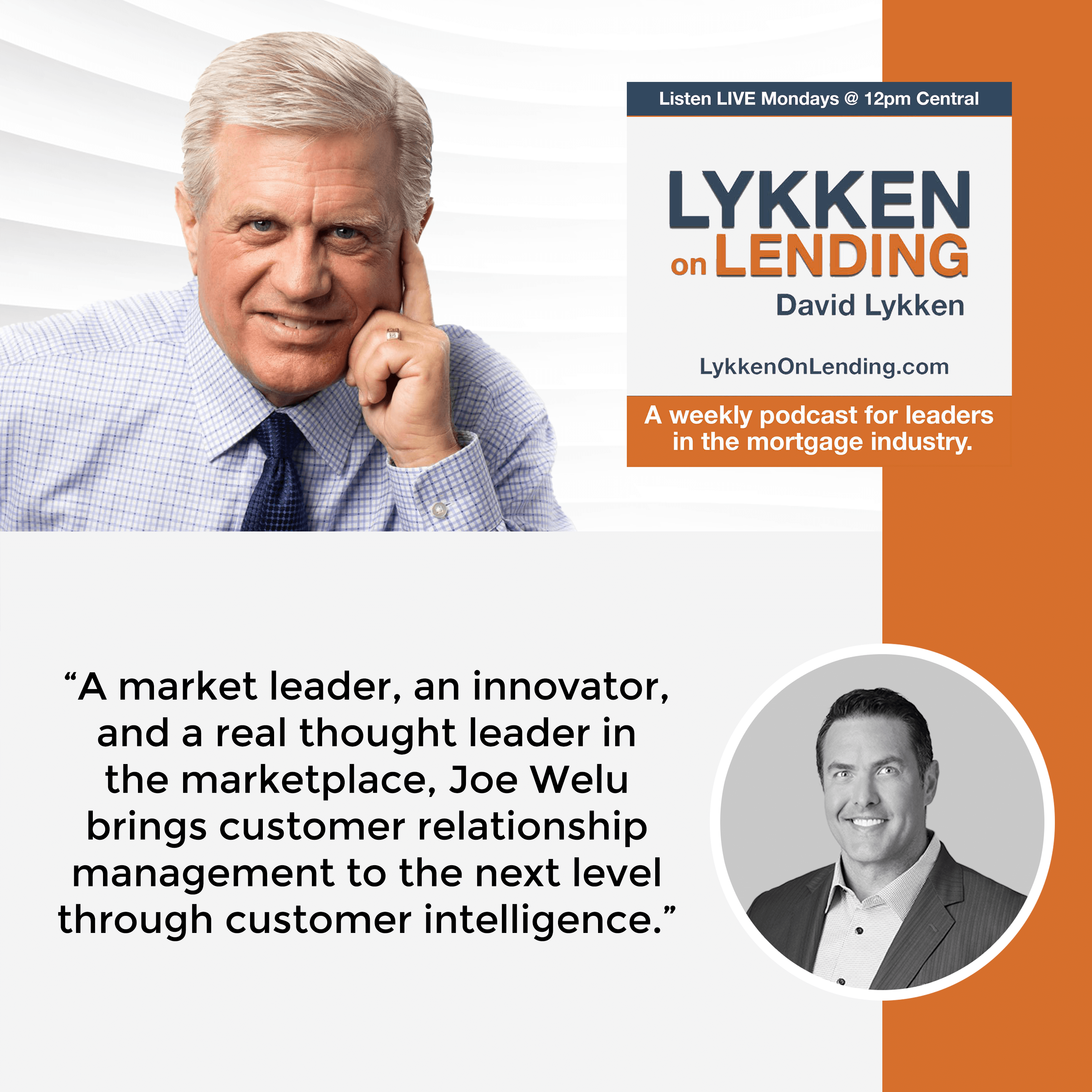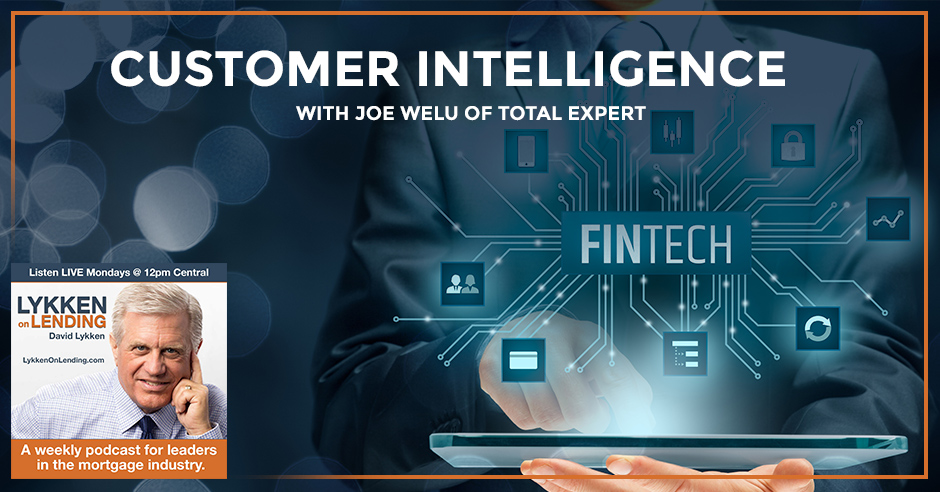The lending industry can definitely benefit from customer intelligence, which uses data science, machine learning, and artificial intelligence to gain insights about customers and how they can be served better. In today’s episode, Total Expert CEO Joe Welu joins David Lykken and shares the innovative solutions of the Total Expert fintech system. Joe explains how data-driven businesses take the lead in today’s lending market. Tune in to find out how to take advantage of customer intelligence, data science, and AI to drive any financial services business forward.
—
Watch the episode here
Customer Intelligence With Joe Welu Of Total Expert
I’m excited to have back on the show, Joe Welu. He is the Founder and CEO of Total Expert, a market leader and innovator, and a real thought leader in the marketplace. I’m excited to have you back on the show, Joe. Good to have you.
Thanks for the opportunity. Good to be back with you.
I respect the vision that you have and the direction that you’re taking so much, Total Expert. You have become so much more than just a CRM. Last time, you introduced the topic of Customer Intelligence. I enjoyed that conversation, but you keep taking it further, and then it keeps expanding. What’s interesting is others are now picking up on the “intelligence” part of it and starting a little bit of plagiarism, it looks like that are going on out there with some others that we mutually like and respect. Tell us a little bit about what’s been developing in that and what the bigger vision is.
Maybe start with the vision. The vision has always been this. We believe that lending and broader financial services is still very much a people business. It’s about long-term relationships. Ultimately, if you want to build long-term relationships with customers, you want to deliver value to them. You need to deeply understand what’s going on in their world and what their financial profile looks like.
Lending and broader financial services is still very much a people business. Click To TweetWe started and grounded on the fact that we believe in fundamentally the more data and the more intelligence that you can have on a particular customer, that customer profile. If you can continue to build that robust data set around that customer, it’s going to enable you to better serve that customer and ultimately, create growth opportunities for your organization.
Customer intelligence is becoming embedded throughout our entire platform as a core competency for Total Expert. We launched our initial package of data points of alerts. We call them insights. We’re continuing to expand where that goes. We’ve done massive amounts of work from a technology perspective on the architecture and infrastructure to be able to do a massive scale that so many of our large customers need. We’re going very fast down the path of bringing in additional data sources and continuing to enrich that profile for every record in the platform.

I don’t want to get too much under the hood, but architecture is something I have come to respect and dig into a little bit. Give us some insights into your philosophy about architecture when you’re doing. That’s where a lot of people have a vision, but it’s oftentimes in how it’s architected and built where things don’t perform quite as represented, but you are performing real well. Talk about that.
We’re fortunate to have an amazing engineering and product team internally at Total Expert. Over the past couple of years, it’s been understanding what our customers’ goals are. Ultimately for us, everything ties into making our customers successful. Everything we do has to make sense for how do we create value to our end customer.
We realized this in meeting with a lot of the strategic leaders and the scale that they’re thinking, the vision they have for their organizations, the size of companies they want to build, and the sizes of the customer databases they want to be able to continue to build on top of. We realize that we need to become the platform they need us to be. It’s ultimately infinite scalability.
I’m not by nature a technical guy, but I certainly do love technology. I’ve learned very carefully through trial and error. When you’re building technology and software without getting too in the weeds, if you don’t have the right architecture decisions and put things in place correctly, the machine will break down and will ultimately derail you.
For the sake of our customers being successful, we wanted to invest in making sure that we have this promise of the most comprehensive customer profile in the industry that Total Expert is able to assemble. We’re going to be able to execute on all the opportunity you’re able to unlock from all that data. It was grounded in the necessity of being able to deliver on that scale, and so that led us to do some backend work in understanding where we needed to do some investments. We made those investments.
You’re doing well. For example, in 2022, Total Expert powered over 2.1 million mortgage loans. That’s extraordinary.
Isn’t that crazy?
It represents 30% of the total US mortgage loan volume. It’s impressive. If you could unpack how you’ve accomplished this because you were talking about architecture and scale a minute ago. This is proof that you’ve already achieved that, but there’s more ahead.
Let me be clear on that, David because we look at it as we haven’t achieved anything at this point. We’re just getting started. You have to have that mentality, and I believe that. The only reason that we’ve been able to evolve and be successful is that we’ve been able to have fantastic partners in our customers and ultimately some of our other partners in our ecosystem.
We’re incredibly grateful to be able to get to that scale, but it has to do with aligning your technology to what your customers need to accomplish and what drives value for them. Traditionally, we’ve done a great job. Our team has done a great job at making sure we’re aligning to the most important things inside the customer.
An example of that is right now, every organization is trying to figure out, “How do they use data? How do they use technology to create and generate more deal flow or more opportunities?” We’re leaning in those partnerships and helping them identify. I was on the phone with a customer and they’re in growth mode. They’re recruiting and trying to level up the volume. We’re looking at the customer journey and saying, “There’s opportunities to use data and intelligence to surface additional deal flow that you’re missing.” Those are the types of things we’re having conversations about every single day.
I want to get your perspective of what you see are the biggest opportunities for lenders who aren’t currently leveraging customer data and intelligence to give the insights especially in the purchase market where we are at now and how things are off. You’re talking about how those that are using it are having greater success. Dive into it a little bit more.
The organizations that have embraced data and being data-driven in all across their business are winning at a much higher rate than the organizations, banks, lenders, credit unions, or whatever the segment is, that have fallen behind on their sophistication. You don’t need to be incredibly sophisticated to be a data-driven business.

Customer Intelligence: Organizations that have embraced being data-driven are winning at a much higher rate than businesses that don’t.
There’s a lot of technology that simplifies it, but a lot of the lenders that we partner and work with are at various points in their maturity curve of being data driven in the business. You look at with lenders is the organizations that have X thousand past customer records in their platform. Are they taking steps to make sure they retain those customers?
Part two is the leads they’re generating. Are they putting intelligence around those leads? Are they monitoring those leads? Are they protecting that pipeline so they understand what’s happening along that part of the customer journey? What happens when you do a great job at that? You ultimately increase your conversions. It’s the same amount of marketing money, same amount of personnel costs, but higher production rates because you’re simply converting more of those leads into closed deals. Those are the two buckets that we see lenders successfully working in closing those gaps and generating deal flow.
It’s exciting to see the difference. We have a number of clients. In fact, we recommend your product to our clients if they don’t have it yet.
Thank you.
It’s evangelizing the vision because what we we’re all about is helping more people get into homes and solving the issues. Therefore, you got to help the lenders. Your tool is so effective to that. Give us some insights, Joe, into how you see the future, especially as it relates to customer intelligence.
First, we see the future CRM as a category is an outdated word. Let me explain why. CRM in its traditional sense, is static. I put a bunch of data in a CRM, and its only value is how much input your sales team is putting into that CRM. Are they using it? Are they tracking it? We believe the future moving towards this platform is dynamic.
CRM is outdated because it is static. The future of this platform is to be dynamic. Click To TweetIt has a comprehensive profile of every customer and every lead at the center. There’s intelligence that continues to enrich that profile so that you understand what the customer needs, their communication preferences, their timing, and their intent. There’s an orchestration and an automation layer that will take action on all of that intelligence and data. It will enable my sales organization, my customer-facing teams to have very high quality conversations to give advice at the right time.
That’s how we see things evolving rapidly. There are a lot of big lenders out there that understand the future is about being data-driven. It’s still human first. Human-centric, meaning people are still fundamentally critical, but I have to be smarter about powering the business. Historically, we’ve seen the LOS, a CRM, a POS, and your servicing platforms. Now, those are all data sources that you should be able to connect together to draw this holistic profile of a customer, what they need, what they want, and what’s going on in their world. Ultimately, we see the biggest value is going to belong to the organizations that can connect all of those dots.
There’s some new exciting developments. ChatGPT is one of them. I’d love to get your thoughts. Is it possible to integrate this into what you’re doing?
We’re sending a team out to San Francisco to meet with the OpenAI team to work on bringing some of those capabilities into our platform. ChatGPT, which is a product from the OpenAI organization, is game-changing in a sense that seeing AI start to be able to do things that we assumed were probably ten years down the road.
It’s the underlying technology and these large language learning models to where these platforms have massive treasure troves of data from every single thing on the internet. It’s essentially taught these models to understand basic human language. What we see as the future is not so much AI, the capabilities such as ChatGPT.
I had the opportunity to hear from some of the leadership at OpenAI via one of our investors about what they’re going to be rolling out for the developer community and the software community to be able to accelerate the viability of those capabilities in everyday business software. We see the big use cases are moving forward. It’s not so much about how I can completely replace the work that somebody’s doing, but how I can make them incredibly more effective.

Customer Intelligence: AI is not so much about how it can completely replace the work that somebody’s doing, but how it can make them incredibly more effective.
I’ll give you an example. If I’m trying to put out a piece of content or a campaign, and I’m relying on my copywriters, that might be 10, 15, or 20 hours of time to draft those emails and those campaigns. What if the first draft was completely done automatically for you, and the skillsets of your copywriters were simply spending the last half an hour going through and honing it.
That’s what gets so exciting when you look at what this is capable of doing and how it can accelerate. You used the right term. What I appreciate you saying is it’s still going to be a customer face-to-face, people-to-people business. When we add tools around the people to accelerate this process, it is a game-changer, Joe.
I think of it as we’re giving people superpowers. That’s what it is. If you can give your average marketer or your average salesperson some superpowers to help them be better at what they do and help them be able to focus more on what we believe is the most important thing, which is the relationship, think of the lifetime value of those customer relationships. How do you put the human in the scenarios where they’re connecting human-to-human. They’re spending their time on the relationship giving high-quality advice, and you’re just making everything more efficient. That’s how we are thinking about it.
How do people get ahold of you? What’s the most effective way? Go to the website? Reach out to your salespeople?
My email address as always, [email protected]. It hasn’t changed. I try to answer everything that comes in. Our website is TotalExpert.com. We’re always happy to have conversations. We’re having a lot of high-level conversations, comparing notes with leaders, even leaders from organizations that aren’t customers. We love engaging in those conversations, certainly.
That’s exciting. Joe, thank you so much for being here with me. I appreciate it.
Important Links
- Total Expert
- Customer Intelligence – Past Episode
- ChatGPT
- OpenAI
- [email protected]
- https://www.LinkedIn.com/in/Joe-Welu-4056726/
About Joe Welu
 Joe Welu is the founder and CEO of Total Expert, the fintech software leader that launched the first customer experience platform purpose-built for modern financial institutions. Since 2012, Joe has led Total Expert’s vision, culture, and growth to more than 300 employees today. The company powers CRM, marketing, and customer engagement for more than 170 financial institutions – from leading community banks and credit unions to 15 of the top 25 U.S. banks and lenders. Total Expert’s growth has skyrocketed since its inception, being named the #1 CRM platform by STRATMOR Group and earning top spots on the Inc. 5000 and HousingWire Tech100.
Joe Welu is the founder and CEO of Total Expert, the fintech software leader that launched the first customer experience platform purpose-built for modern financial institutions. Since 2012, Joe has led Total Expert’s vision, culture, and growth to more than 300 employees today. The company powers CRM, marketing, and customer engagement for more than 170 financial institutions – from leading community banks and credit unions to 15 of the top 25 U.S. banks and lenders. Total Expert’s growth has skyrocketed since its inception, being named the #1 CRM platform by STRATMOR Group and earning top spots on the Inc. 5000 and HousingWire Tech100.


